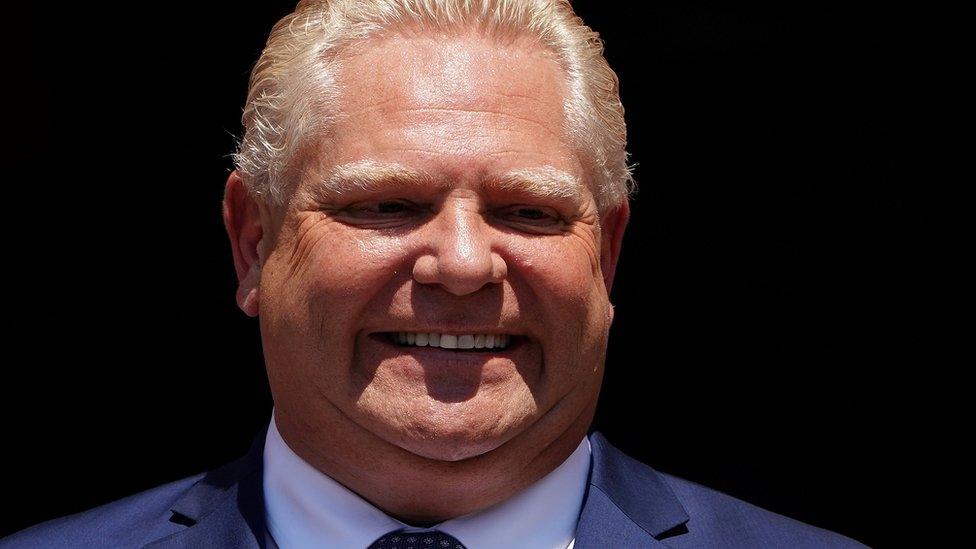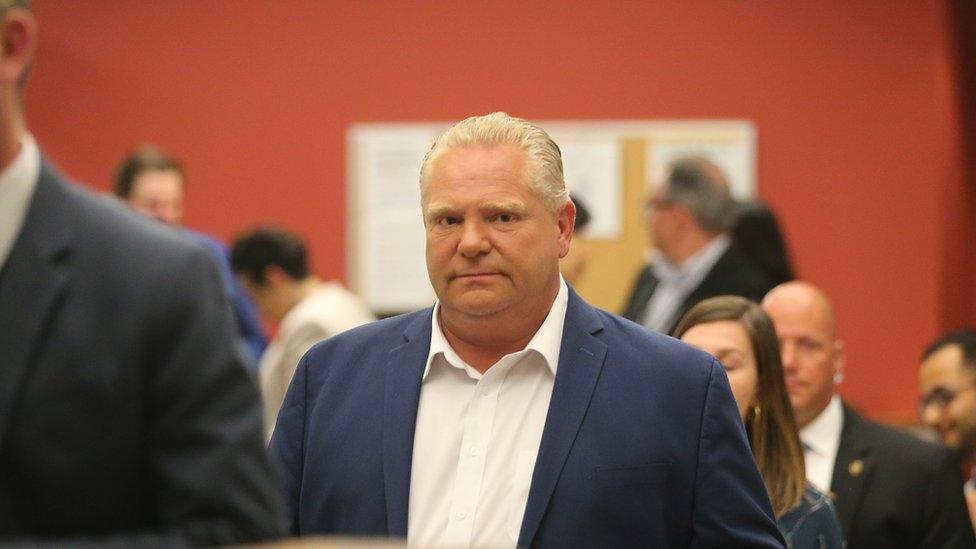Controversial cuts to Toronto council can proceed - court
- Published

Ontario Premier Doug Ford is facing criticism for using the notwithstanding clause
A Canadian appeals court has made way for the province of Ontario to go forward with controversial cuts to the size of the Toronto city council.
Ontario Premier Doug Ford intends to slash the council by half to end "dysfunction" at city hall.
The move was decried by many residents and city officials alike, and a lower court found the cuts unconstitutional.
But an appeals court stayed that ruling Wednesday, which means council boundaries will likely be redrawn.
"Unquestionably, Ontario's announcement of its intention to introduce Bill 5 disrupted the campaigns that were already underway. However, Bill 5 does not limit or restrict any message the candidates wish to convey to voters," said the ruling released on Wednesday.
The stay puts an end to a months-long power struggle between the city of Toronto, which is the most populous in Canada, and the provincial government led by Mr Ford, who is the brother of late Toronto mayor Rob Ford.
He served on Toronto city council as a councillor himself for one term, and made an unsuccessful bid for mayor in 2014, coming second behind current Mayor John Tory.

Timeline of events
27 July: Mr Ford proposes a law redrawing local wards to align with provincial and federal districts, which would reduce the size of council from 45 to 27 seats.
The move sparks outrage amongst many of the city's residents and would cause major headaches for incumbent councillors who planned to run for re-election in the October municipal election.
14 August: With a majority in the legislature, Mr Ford's Progressive Conservative Party passes a bill to cut city council.
20 August: With election plans in disarray, the city decides to take the province to court.
10 September: Superior Court Justice Edward Belobaba rules that the law cutting the size of Toronto's council from 47 wards to 25 violates the right to free speech because it was introduced so close to the October municipal election.
Mr Ford said he will pass a bill cutting council anyway, invoking the Constitution's "notwithstanding clause" to overrule the judge's decision before October.
The obscure clause allows the province to pass a law in spite of a right found in Canada's Charter of Rights and Freedoms.
It is essentially an opt-out option that can be used for a five-year period, introduced when the federal government was trying to get all provinces to sign the Charter in the 1980s.
16 September: Mr Ford calls the legislature back for an all-night Sunday seating to debate the bill invoking the notwithstanding clause to cut council.
Hundreds of protesters camp out all night to voice their frustration.
19 September: A panel of three judges for Ontario's highest court stay Justice Belobaba's ruling, saying they believe he erred in his assessment of the effects of the cuts on Canada's Charter of Rights and Freedoms.

Where are we now?
Now that the appeals court has stayed the lower court's ruling, Mr Ford says he will not invoke the "notwithstanding clause".
The election will likely proceed as planned for 22 October, with 25 wards instead of 47.
The province's appeal of Justice Belobaba's ruling will likely be heard after the election.
The city could ask the Supreme Court of Canada to hear its argument that the stay be lifted before the election. If it loses the appeal, it could also take the province to the Supreme Court after the election.
- Published8 June 2018

- Published8 August 2018

- Published13 September 2018
